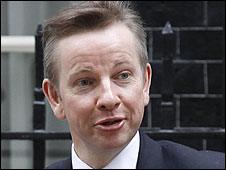Opt-out offer for outstanding schools
- Published

Education Secretary Michael Gove wants more independence for schools
Thousands of outstanding schools in England could become academies and opt out of local authority control, under plans announced in the Queen's Speech.
The Academies Bill will also make it easier for parents or other providers to set up new academies.
Primary and secondary schools graded outstanding by inspectors could be fast-tracked into free-standing academies by this autumn.
The ATL teachers' union attacked the plans as "irresponsible".
The Academies Bill, to be presented to Parliament on Wednesday, allows for a rapid increase in schools operating outside local authority control.
Schools which are assessed as outstanding will be able to switch to academy status and opt out of the local authority.
The plans will also remove the council's veto on groups wanting to set up schools with taxpayers' funding.
'Free schools'
The "free schools" policy will now mean that state-funded academies can be set up without needing to consult the local authority.
The pupil premium, which aims to target extra funds to schools with poorer pupils, will be addressed in a separate bill this autumn.
The Academies Bill represents a sea-change - with the potential to remove many of the highest-performing state schools from the local authority system.
Up to one in five secondary schools could leave council control.
The Conservative-Liberal Democrat government wants to give more autonomy to individual schools.
This greater independence from local authority control goes hand in hand in with "free school" plans to allow outside providers to run schools with state funds.
But Mary Bousted, head of the ATL, described the academy proposals as "irresponsible".
She warned that they had not been "thought through" and that the "law of unintended consequences" could mean that the proposals "end up in a mess".
The academy scheme developed by the previous government had been designed to tackle underachievement, with high-profile building projects trying to raise education standards in deprived areas.
It gave academies more independence in an attempt to promote innovation and revitalise education in the toughest areas.
Under the new proposals, academies will be top-performing schools, many located in affluent areas.
Extra cash
Outstanding schools will be deemed as "pre-approved" to become academies - and thereafter all other schools will be able to apply.
About one in seven primary schools are outstanding and one in five secondary schools.
By taking academy status, schools will receive their funding directly from central government and will have greater autonomy over how they are run.
The previous academy scheme aimed to have 400 schools - but there are more than 2,300 outstanding primary schools and more than 600 outstanding secondary schools which could adopt academy status.
It remains uncertain how many schools will apply for academy status.
Head teachers' leader John Dunford suggested that schools could be attracted to opt out by extra funding, as schools are likely to keep the proportion of the budget currently kept by the local authority.
And there will be questions about what will happen to local authority education services if councils are left controlling a diminishing number of schools with reduced funding.
This first education bill from the coalition covers territory that divided the parties in the election campaign.
Education minister in the coalition, Sarah Teather, attacked the free school plan last month as a "shambles".
"Unless you give local authorities that power to plan and unless you actually make sure that there is money available... it's just a gimmick," she said during the election campaign.
There will be a further bill in the autumn, the Education and Children's Bill.
This will promise a pupil premium, a slimmer curriculum, new tests at the age of 11, a reform of Ofsted, and more powers for heads to improve behaviour.
- Published20 May 2010